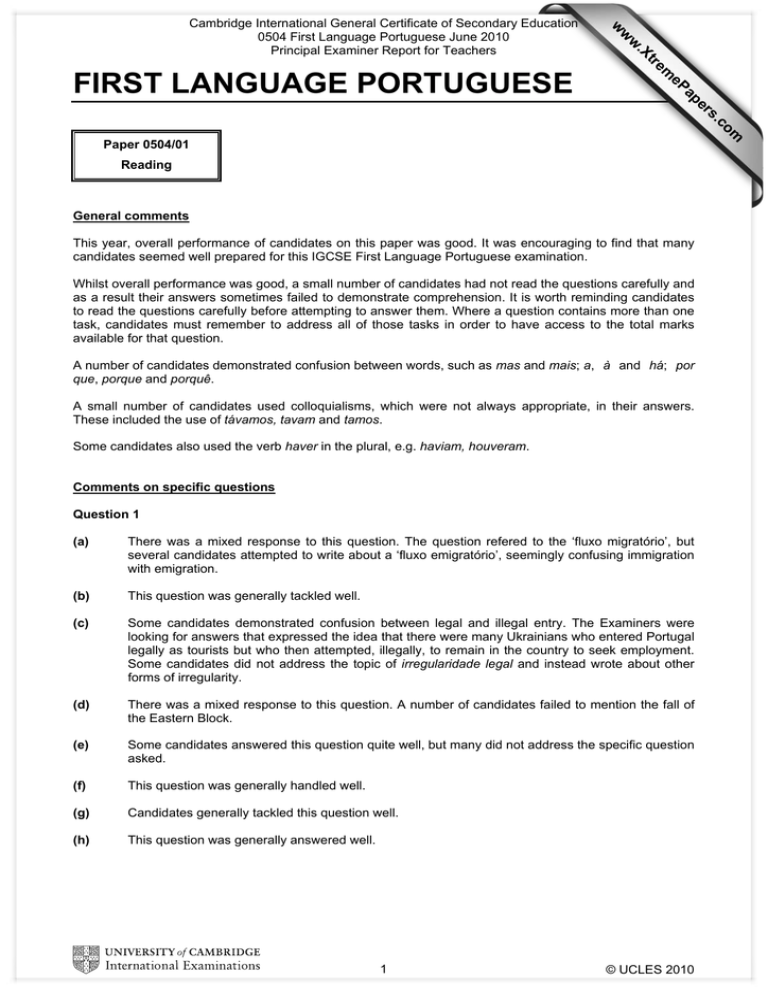www.XtremePapers.com
advertisement

w ap eP m e tr .X w FIRST LANGUAGE PORTUGUESE w Cambridge International General Certificate of Secondary Education 0504 First Language Portuguese June 2010 Principal Examiner Report for Teachers om .c s er Paper 0504/01 Reading General comments This year, overall performance of candidates on this paper was good. It was encouraging to find that many candidates seemed well prepared for this IGCSE First Language Portuguese examination. Whilst overall performance was good, a small number of candidates had not read the questions carefully and as a result their answers sometimes failed to demonstrate comprehension. It is worth reminding candidates to read the questions carefully before attempting to answer them. Where a question contains more than one task, candidates must remember to address all of those tasks in order to have access to the total marks available for that question. A number of candidates demonstrated confusion between words, such as mas and mais; a, à and há; por que, porque and porquê. A small number of candidates used colloquialisms, which were not always appropriate, in their answers. These included the use of távamos, tavam and tamos. Some candidates also used the verb haver in the plural, e.g. haviam, houveram. Comments on specific questions Question 1 (a) There was a mixed response to this question. The question refered to the ‘fluxo migratório’, but several candidates attempted to write about a ‘fluxo emigratório’, seemingly confusing immigration with emigration. (b) This question was generally tackled well. (c) Some candidates demonstrated confusion between legal and illegal entry. The Examiners were looking for answers that expressed the idea that there were many Ukrainians who entered Portugal legally as tourists but who then attempted, illegally, to remain in the country to seek employment. Some candidates did not address the topic of irregularidade legal and instead wrote about other forms of irregularity. (d) There was a mixed response to this question. A number of candidates failed to mention the fall of the Eastern Block. (e) Some candidates answered this question quite well, but many did not address the specific question asked. (f) This question was generally handled well. (g) Candidates generally tackled this question well. (h) This question was generally answered well. 1 © UCLES 2010 Cambridge International General Certificate of Secondary Education 0504 First Language Portuguese June 2010 Principal Examiner Report for Teachers Question 2 Performance on this question tended to be mixed. Whilst there were many good attempts, a number of candidates ignored the instruction to form their response as a dialogue and simply wrote a summary of the experiences of Ukrainian immigrants in Portugal and Brazil, dedicating a paragraph to each. Many candidates failed to address the part of the question which required them to write about expectations/hopes for the future. Surprisingly, very few mentioned access to better jobs as a reason for moving to another country. In general, the language that candidates used in their answers was appropriate, but it was a little disappointing to note that many candidates did not attempt to use their own words in response to this question. It was pleasing to note that the majority of candidates had adhered to the word limits specified in this Question. 2 © UCLES 2010 Cambridge International General Certificate of Secondary Education 0504 First Language Portuguese June 2010 Principal Examiner Report for Teachers FIRST LANGUAGE PORTUGUESE Paper 0504/02 Writing General comments In this paper, candidates are required to produce two compositions, each of which is awarded up to 25 marks. Candidates are awarded marks in two categories for each of the two compositions that they write: the first mark is out of 12 for Style and Accuracy; the second mark is out of 13 for Content and Structure. This year there was a range of marks awarded. Those who received marks at the higher end of the range demonstrate fluency and good development of ideas. Compositions tended to be well structured with welllinked paragraphs. However, weaker candidates often struggled to develop their ideas adequately and as a result their marks were limited. In terms of language, there were frequent errors in the position of pronouns, including a tendency to commence new paragraphs with a pronoun, such as Me lembro, Me tornei or Lhe dei. Common spelling errors included atravez, cidadões, technologia, abraçei, começei, cresçer, dedicassão, involve and differente. Candidates also demonstrated confusion in their use of some words, such as tudo and todo; a, há and à; mal and mau; mas and mais. As in previous years, there was heavy reliance on the word coisa, which often indicated a certain limitation in vocabulary. There was frequent use of the word você, which often resulted in an overly-familiar tone in the composition. A number of candidates failed to use commas and accents appropriately. Candidates are reminded of the importance of presenting their work clearly and legibly. It was pleasing to note that the majority of candidates had adhered to the word limits specified in the question paper. However, a small number of candidates exceeded the specified word limits: candidates should be reminded that going beyond this does not improve the quality of the work presented and may indeed increase the likelihood of errors occurring. 3 © UCLES 2010



